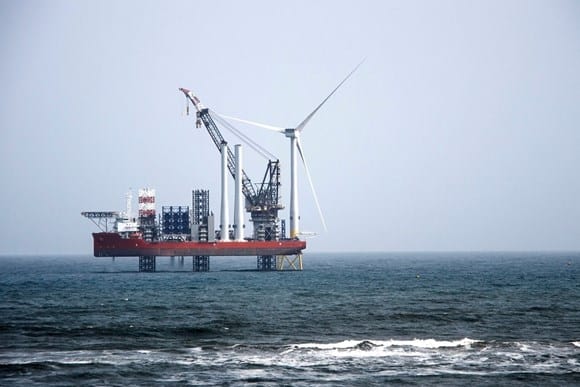AN action plan for ensuring Scotland’s workforce has the skills needed for the transition to a net-zero economy has been published for the first time.
The Climate Emergency Skills Action Plan identifies a series of priority areas focused on employers, education and individuals that will help Scotland capitalise on job opportunities emerging from the net-zero transition.
Co-ordinated by Skills Development Scotland (SDS), the plan complements the updated Climate Change Plan published today by Scottish Government which commits Scotland to a green recovery from COVID-19.
Skills Minister Jamie Hepburn said: “The updated Climate Change Plan puts Scotland on a pathway to our world leading climate change targets as well as delivering a green recovery from COVID-19.
“Our first Climate Emergency Skills Action Plan will, crucially, help us ensure people have the right skills to support a just transition to a net zero economy.
“The Green Jobs Workforce Academy will play a key role in this, supporting those who are facing redundancy to upskill and reskill so they can capitalise on green job opportunities as they emerge.”
Measures identified to support a green recovery from COVID-19 include:
- targeted investment to support new jobs in sectors central to the transition to net-zero,
- supporting people to upskill and reskill into emerging green jobs through measures such as the Flexible Workforce Development Fund and the National Transition Training Fund,
- providing support to those facing redundancy in sectors facing job losses
- ensuring collective regional responses to labour market challenges and opportunities resulting from COVID-19.
Frank Mitchell, Chair of SDS, said: “Over the next two decades the core competences of a wide range of jobs must become more directly relevant to the needs of a low carbon economy.
“That means updating and refocusing people’s skills so they can contribute to rising productivity and help Scottish firms capture a share of growing international markets.
“Meaningful collaboration is required across many agencies to face up to this task, and I regard this plan as an important milestone on the journey towards net-zero.”
Other priority areas identified in the plan include building better understanding and evidence of future skills needs, developing the future workforce for the transition to net-zero and ensuring fairness and inclusion in the skills system as part of a just transition.
The plan includes a series of short-term and long-term measures including:
- launching a Green Jobs Workforce Academy to support existing employees and those who are facing redundancy to assess their existing skills and undertake the upskilling and reskilling they need to secure green jobs opportunities as they emerge,
- establishing a Green Jobs Skills Hub that will cascade intelligence into the skills system on the numbers and types of green jobs that will be needed over the next 25 years,
- creating a Climate Emergency Economic & Investment Leadership Group to provide leadership, oversight and to drive the alignment of skills investment with our national economic ambition.
- maximising the uptake of apprenticeships in green jobs and developing new work-based learning pathways.
The plan was welcomed by Paul Campbell, Head of Learning and Organisational Development at Scottish Water and Chair of the Scottish Apprenticeship Advisory Board Employer Engagement Group.
He said: “The new Climate Emergency Skills Action Plan will provide a necessary focus on the key skills and industries needed to achieve recovery via a net-zero economy and I am encouraged to see green apprenticeships play a central role in this.
“Employer collaboration with government, supply chain and partners – on skills and green jobs – is vital to Scotland’s overall economic recovery and therefore this plan offers welcome support to employers and business across Scotland.”
Today also sees the launch of SDS’s own 10-year Climate Strategy which sets out at high level how Scotland’s national skills body will contribute to Scotland’s national net-zero target across three key business areas: service delivery, engagement with stakeholders and partners, and the organisation and its people. SDS aims to be a lead contributor to a low carbon, inclusive and sustainable economy in Scotland by 2030.
Professor Dave Reay, Chair in Carbon Management & Education and Executive Director of the Edinburgh Centre for Carbon Innovation at the University of Edinburgh, said: “This Climate Emergency Skills Action Plan is hugely welcome, and couldn’t be more timely. Skills and education are the driving force behind Scotland’s transition to net zero and will underpin our green recovery from Covid too.
“A skills system that works for the whole of Scotland requires engagement with the whole of Scotland; from businesses and industry, through government and public bodies, to education providers and communities, all of us are key stakeholders in this climate skills plan and all of us must now ensure it is put into action.”
The plan was also welcomed by Claudia Rowse, Deputy Director for Sustainable Growth at NatureScot.
She said: “We know that transformative change will be needed across society if we are to meet the unprecedented challenge posed by climate change.
“Recent research by NatureScot revealed the huge opportunity for nature-based jobs to help Scotland secure a green recovery from the coronavirus pandemic and transition towards a net-zero economy. That research also identified a number of barriers – including skill shortages, access to training opportunities and a lack of diversity.
“This action plan is an essential step towards addressing those challenges and realising the huge potential that exists for us to build back better – ensuring a fair, inclusive green recovery that tackles the twin crises of biodiversity loss and climate change.”






